A first-half Sun Ke brace was enough to give China maximum points from the Asian Cup group stage for the first time in their history, but some gloss was taken off the victory by a sloppy second half performance.
With Guozu already safely through to the quarter-finals as group winners, there was little to play for against a North Korean side that had been eliminated following a 4-1 hammering at the hands of Saudi Arabia, and the course of the first-half seemed to confirm the two teams’ polar positions in group B. However, the roles were reversed in the second period, and China were somewhat fortunate to leave Canberra with their 100% record in tact.
Sun Ke 1′, 42′
North Korea 1
Gao Lin 56′ (o.g.)
It took just 44 seconds for Sun to take advantage of some dreadful defending and convert Mei Fang’s long, diagonal ball. The North Koreans offered little in the way of a response and Sun was the beneficiary of more sloppy work from the opposition backline when he was able to head in Jiang Zhipeng’s cross in the 42nd minute.
In a game that lacked intensity, there seemed little chance of a Korean revival, but they were offered a lifeline eight minutes into the second half when a Zhang Linpeng goalline clearance cannoned off the hip of Gao Lin and back into the Chinese net.
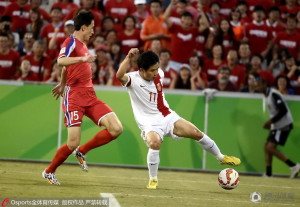
Good To Be Back: Hao Junmin returned to the starting line-up after starting on the bench against Uzbekistan
Australia’s loss to South Korea the day before meant that the tournament hosts were confirmed as China’s quarter-final opponents and, with such a difficult game on the horizon, it was somewhat of a surprise that Perrin only made three changes from the team that started the 2-1 victory over Uzbekistan four days earlier. Sun Ke, Hao Junmin and Cai Huikang were brought in to replace Wu Lei, Wu Xi and the suspended Ren Hang. There was also a change in formation when, having played five at the back against the Uzbeks, Perrin reverted back to the 4-2-3-1 which led his side to a 1-0 win over Saudi Arabia.
First Jang Kuk-chol failed to get off his feet in an effort to head it away and then Jang-Song-hyok watched the ball bounce over him and into the path of the grateful Sun. Although there was an element of fortune in the ball reaching him, the Jiangsu Sainty winger provided a cool finish and has written his name into the history books with China’s fastest goal in Asian Cup history.
The Rimyongsu forward should have done better, and his miss was punished three minutes later when Sun headed in his third goal of the tournament. Left back Jiang Zhipeng had an excellent first-half attacking down the wing and he was given yet another opportunity to whip in a good cross when Hao Junmin set him free with a well-weighted pass.
The Guangzhou R&F man had an eternity to pick his cross and he played a dangerous looking ball between the goalkeeper and the backline. With no Chinese forwards attacking the ball, the emphasis was either on the goalkeeper to come and claim or a defender to head clear, but neither of these things happened and Sun was allowed a free header at the far post that he gratefully forced into the net.
In the 56th minute, Pak Kwang-ryong was able to beat Zhang Linpeng to the byline and his neat chip to the back post found Jong Il-gwan in acres of space. Jong took a neat first touch and his finish beat Wang Dalei only to be blocked on the line by Zhang who had done well to recover his position. Unfortunately, the defender’s clearance went straight into the side of Guangzhou Evergande teammate Gao Lin and he was unable to keep it out a second time.
It was a half of football that China will want to put behind them, but that should be pretty easy to do with the enticing prospect of a sold out game against Australia in four days time. Perrin’s team demonstrated defensive instability for the first time in this tournament, but the unit was not at full strength throughout the game and it is better to focus on the positives. Sun Ke is growing in confidence, Jiang Zhipeng is a legitimate threat down the left and Zheng Zhi remains a commanding presence in the centre of midfield.

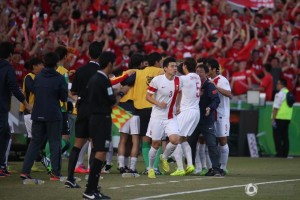
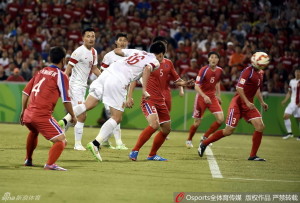
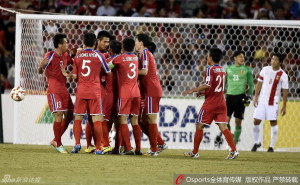
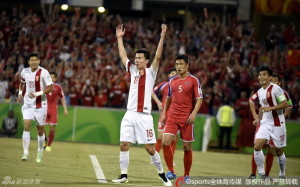
Thanks again for these excellent reports.
I couldn’t watch this game so had to follow via twitter and watch the highlights afterwards.
Who are the key players for China these days?
I would pick (in no particular order): Hao Junmin, Zheng Zhi and Zhang Linpeng. Wang Dalei also deserves mention – his distribution has been very good.
This must be Zheng Zhi’s last major international tournament and he has been in great form – even going back to the friendly against NZ (scored that obscenely wicked goal from the right with his left foot).
I think it’s hard to look past Sun Ke considering the way he’s played in Australia.
Asking the question of what Gao would have done with this side is impossible. I would expect if Gao was manager there would likely be at least 5 different players included in the squad. Gao was also a serial meddler, constantly bringing in new blood and that lack of stability is one of the things that hurt China at the Asian Cup four years ago. It was also one of my concerns with Perrin, but somehow (I’m not sure he even knows) despite all of that he’s found a squad that really works together.
Hard to go past Sun Ke’s goals but I didn’t see the Uzbek game so don’t really have a handle on his contribution throughout the game, whereas I read hear and in Sina about Hao and Zheng putting in good shifts.
No doubt Sun’s first two goals where well taken and individual efforts, but his header goal was a bit of a doddle.
My way of looking at it is if the team didn’t have Hao, Zheng or Zhang Linpeng, would they have got the results they did?
Re Perrin and his tinkering – it may be as Jamie suggests in his post that this is more a measure of Perrin’s tactical flexibility (but thankfully he reverted to the 4-2-3-1 formation for this game). If so this can only work if the players have a good understanding of their roles and responsibilities, and part of that relates to the players understanding and knowing what each other is doing.
Yet to be fully won over but he is certainly doing something right! He deserves the accolades and his job should be secure for now.